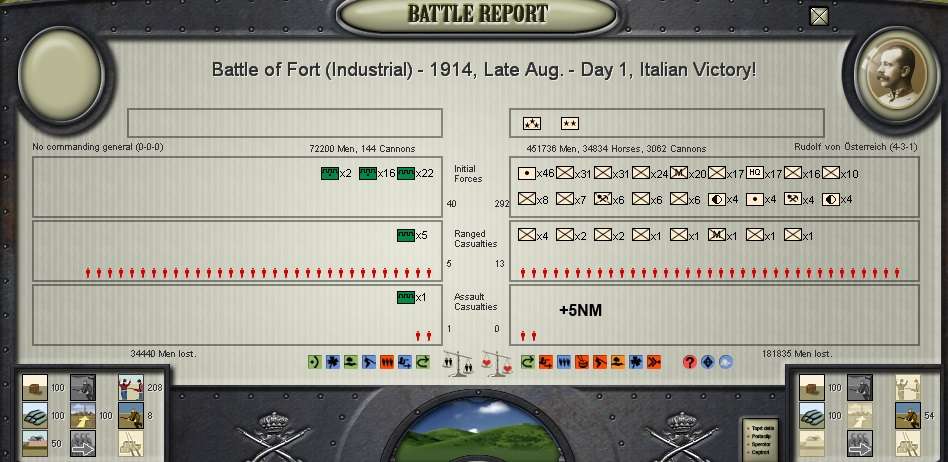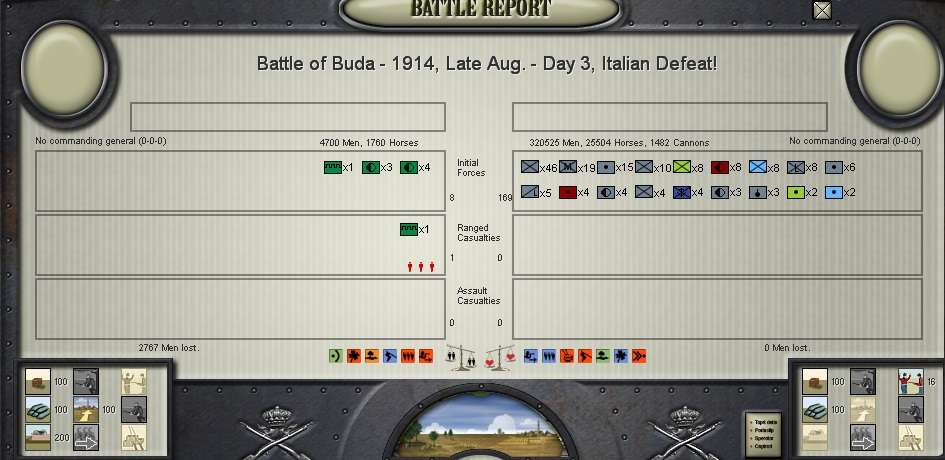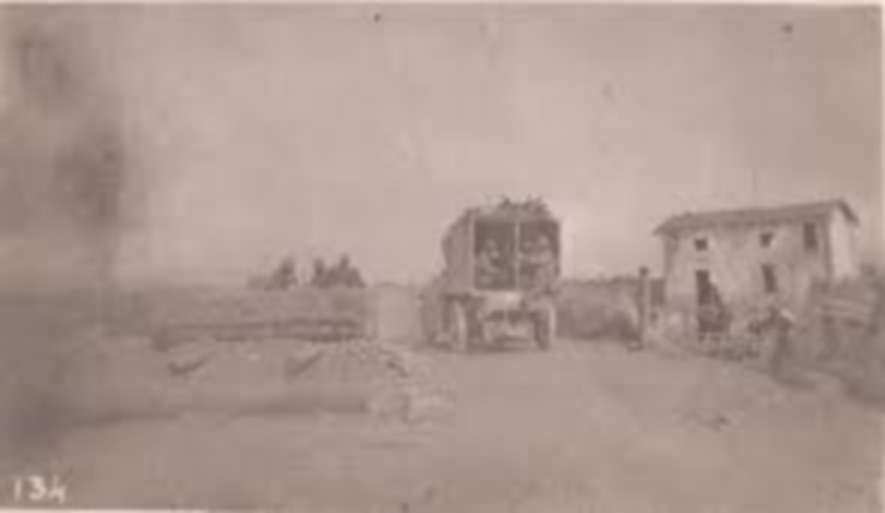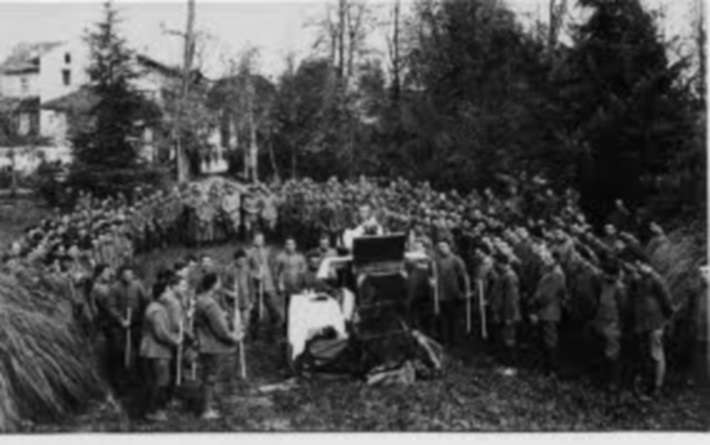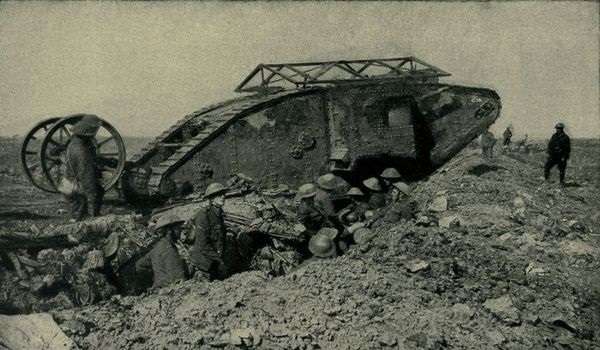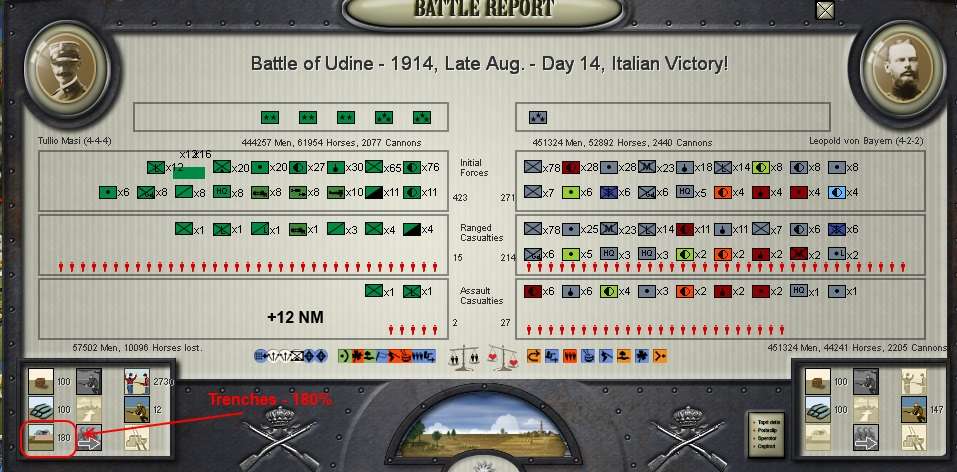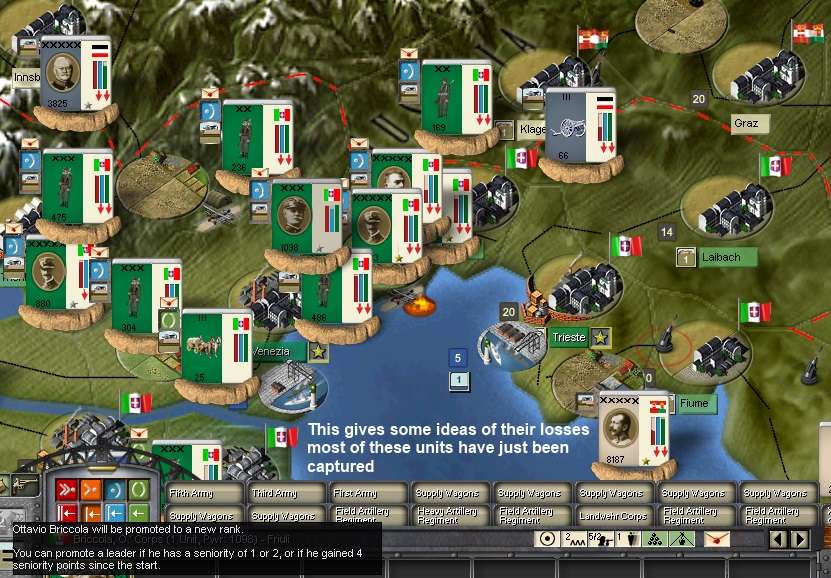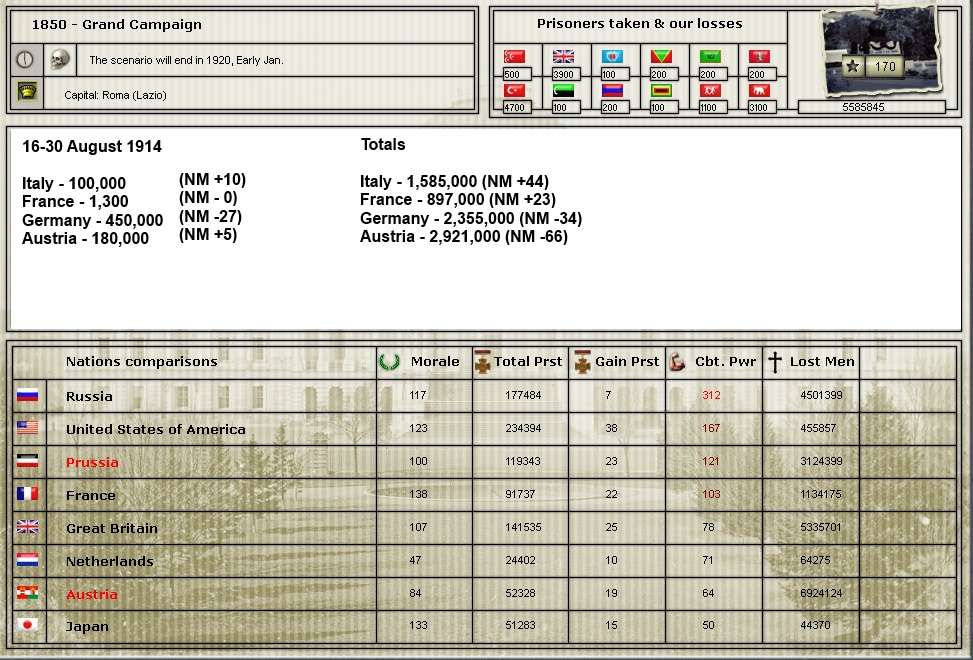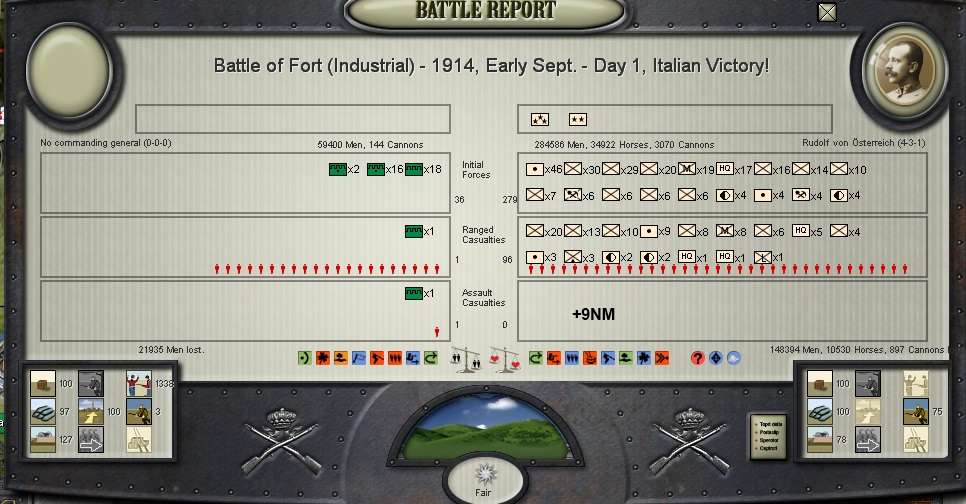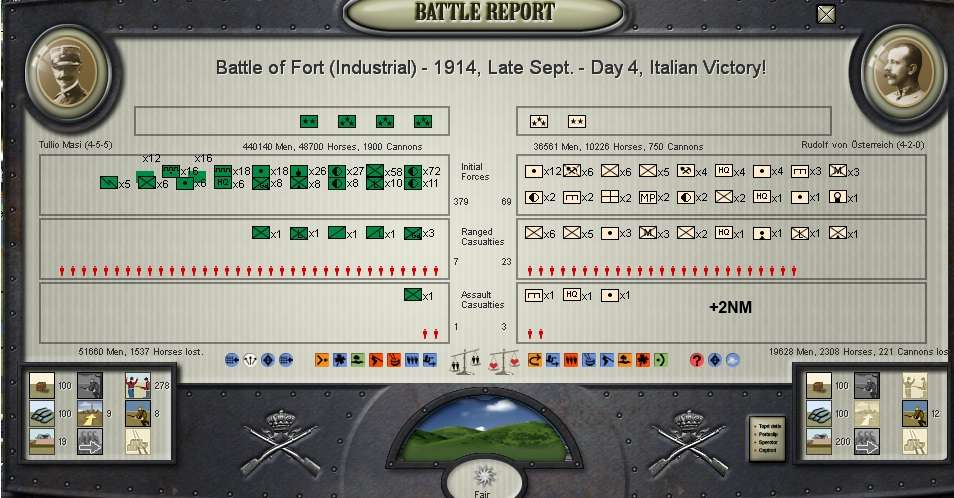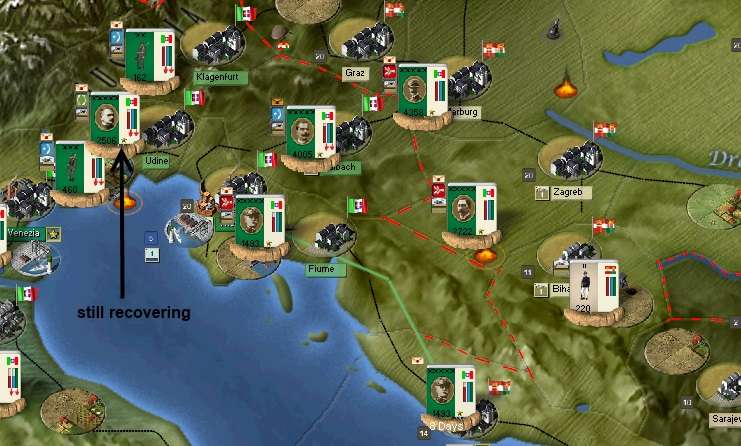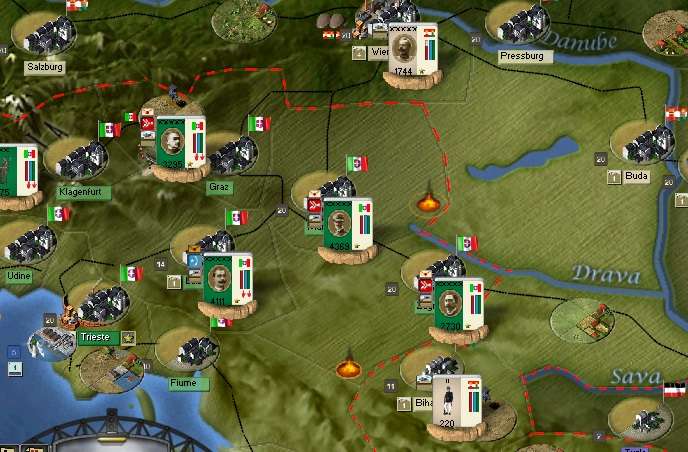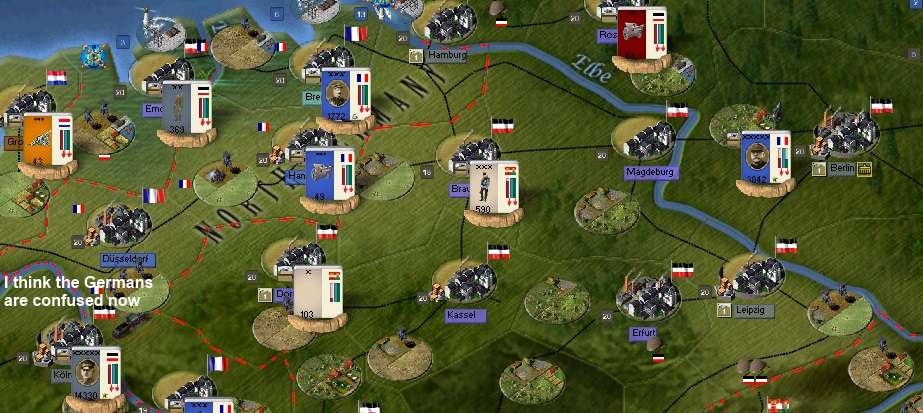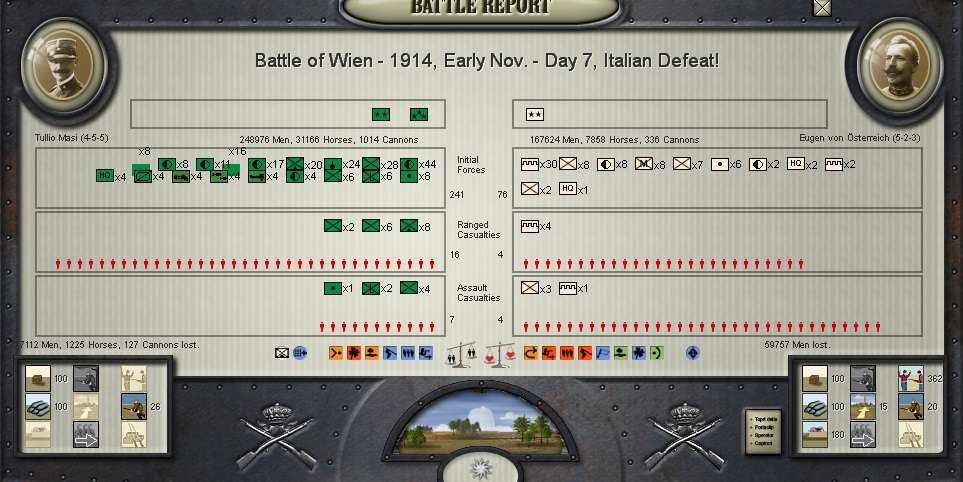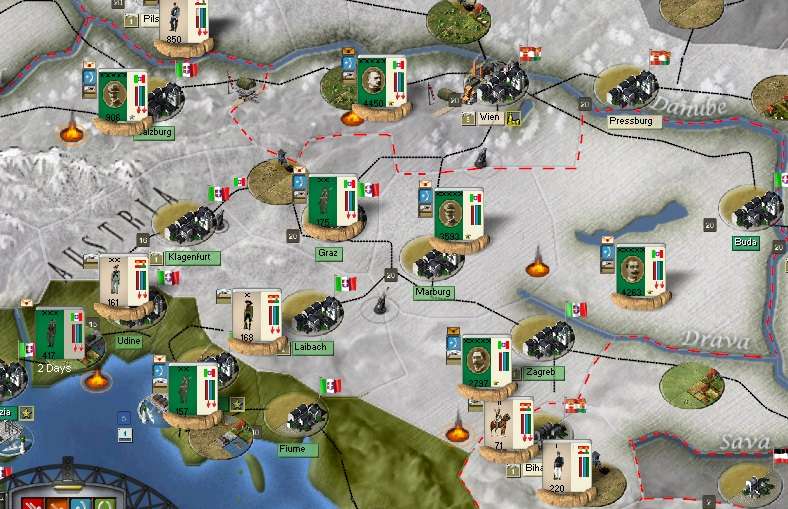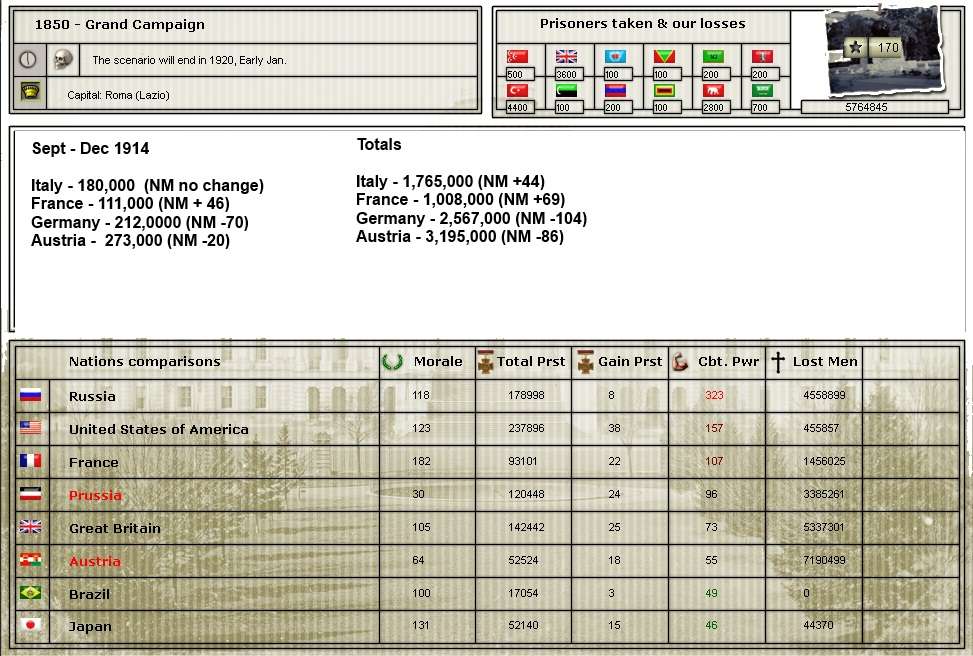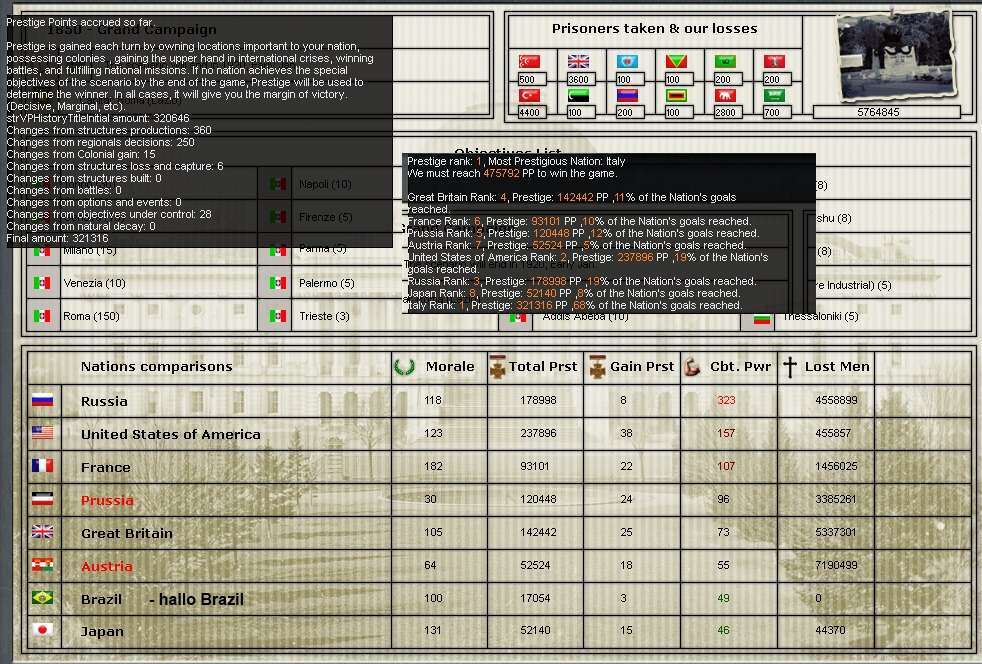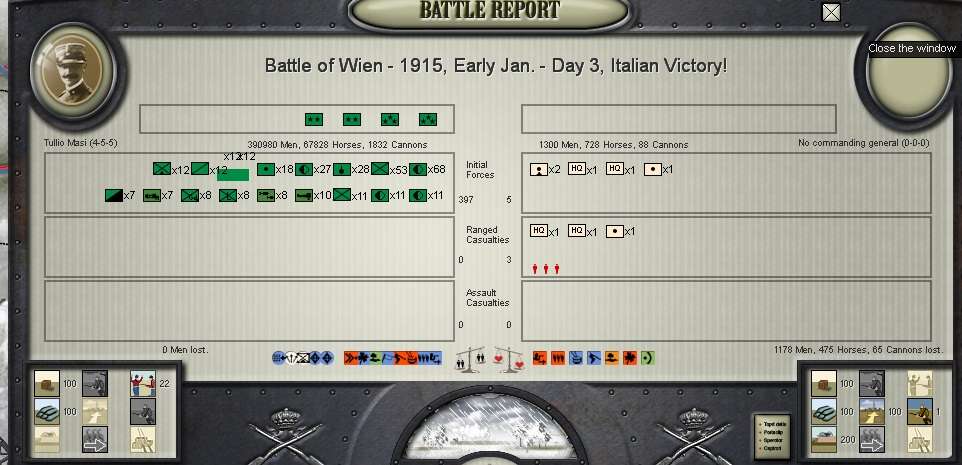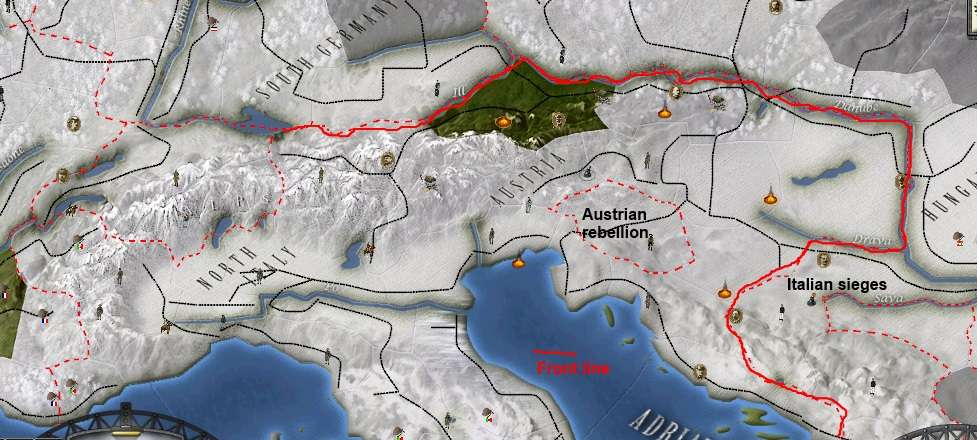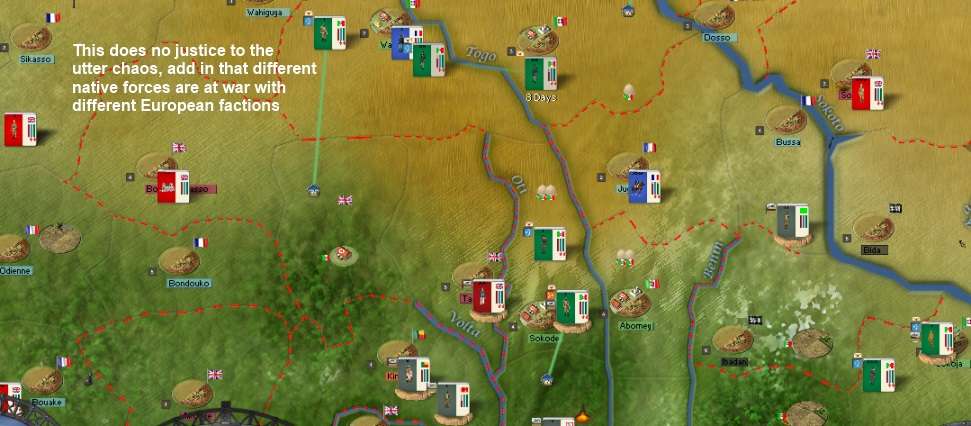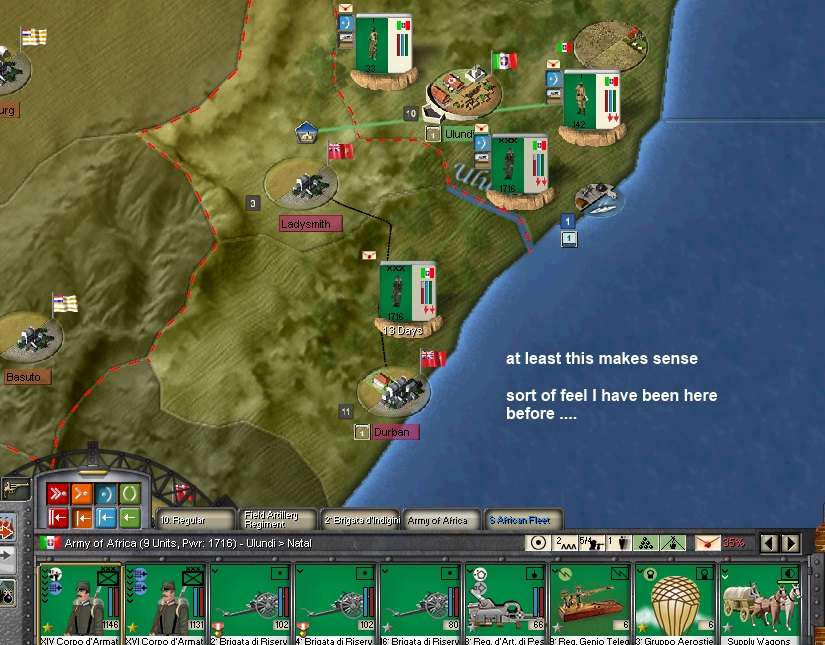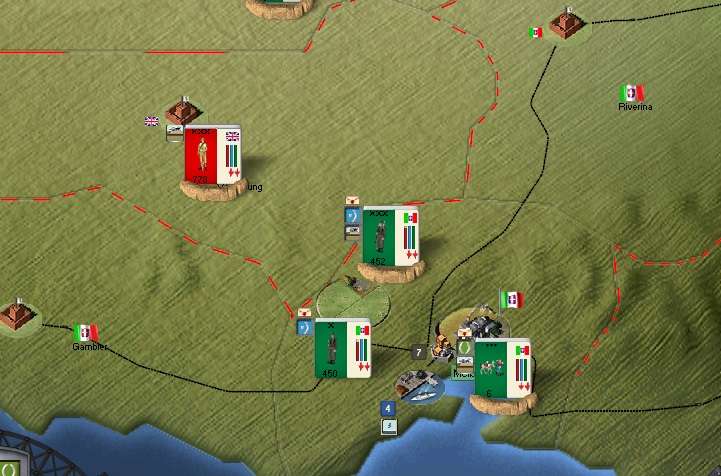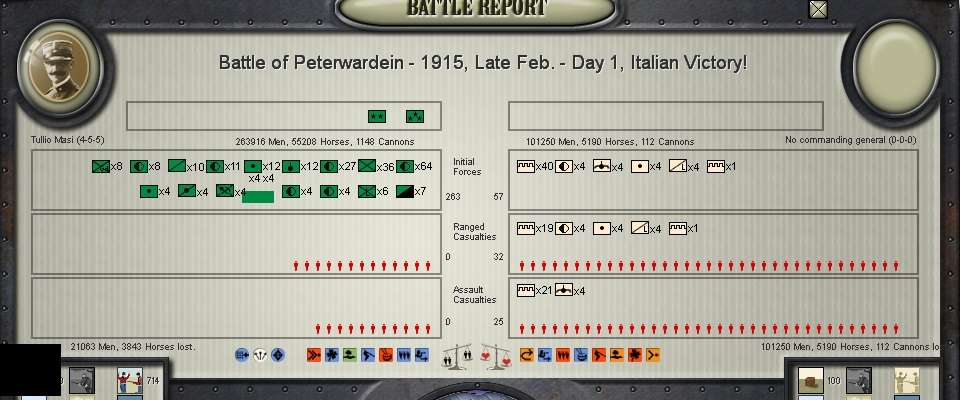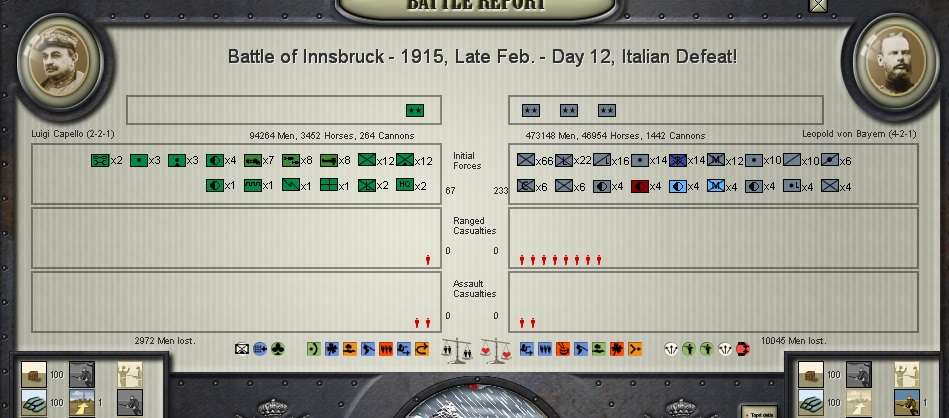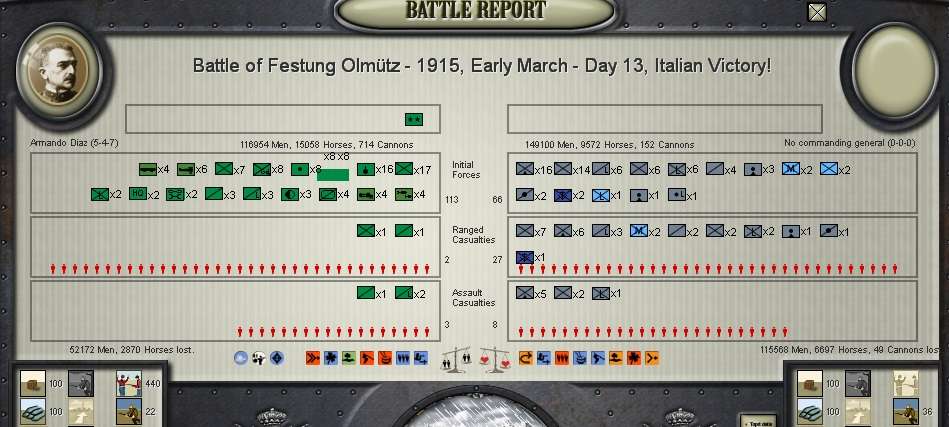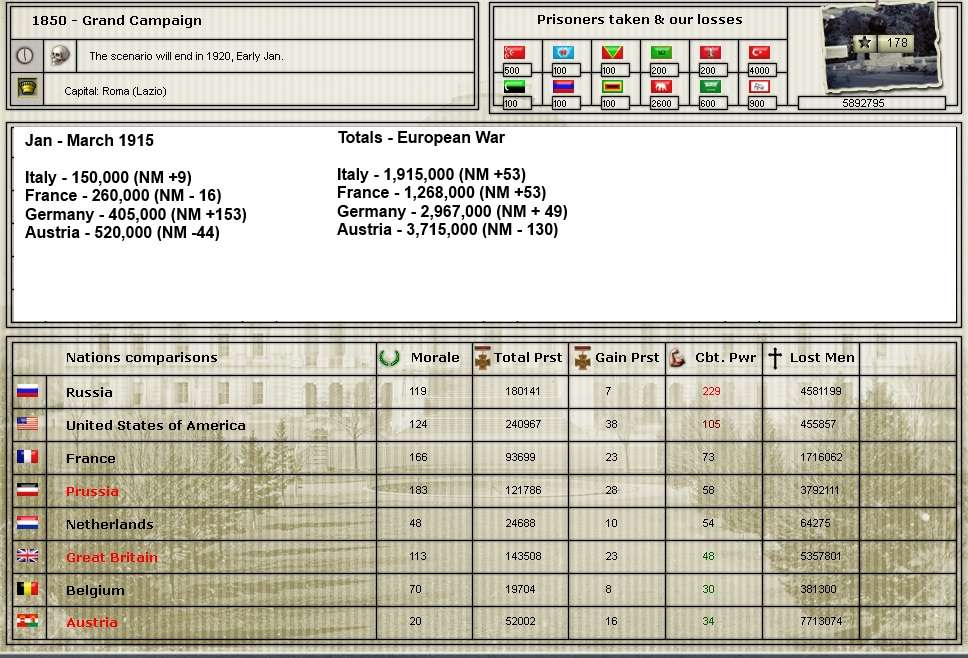First a confession, I broke off the last update with the critical event of the Austro-German offensive unreported. Not least, at the time, I was utterly unsure how to regain my balance as I kept on being forced back and unable to hold a province.
So what happened at the end of this turn first had me in complete panic when it appeared that the Germans would force me out of Udine and then in disbelief as I watched the battle progress ...
Heeward wrote:What naval activity has occurred in your war other then keeping the supply lines to Trieste open?
How has the blockade of German / Austrian Ports been doing - You thought that it would not have an effect because they could by materials from other neutrals. Have you found this to be true?
Have you considered coastal bombardment of convenient hostile forces? Part of your job is to just inflict casualties on units to draw replacements from the Austrian (and German) replacement pools.
Given the opportunistic nature of WWI - and the drubbing(s)(?) of Austria - Should you consider an scripting an Ottoman Empire \ Romanian \ etc. declaration of War against them?
Have you considered building corps as a second echelon / reserve - standing behind the line to swap out corps that either have a significant damaged elements or lost elements?
Even a few of these given the command penalties may prove useful.
I'm not sure where the Austrian navy got to. I know they have one (I built it by script) and it was in the Adriatic for some time but I've not encountered it during the war so far. The only naval action I've seen was clearing out a German fleet from the Med trade area. But I have seen a lot of naval movement – both French and German in the North Sea. Also, in 1915, we'll see a rather impressive French use of their fleet.
I'm not risking coastal bombardment as that is an easy way to lose your fleet. This is accurate enough for sail ships but even with modern Dreadnoughts, I'd be vulnerable to convetional land artillery.
I think if the Ottomans have an interest it would be in taking revenge on Italy. I'm assuming they arre recovering from their drubbing by the Bulgarians but if the war goes against me I might add them in (on the Austro-German side).
I've not bothered with the secondary nations – in part as the diplomatic AI will tend to make peace quite quickly if it sees nothing to gain, and neither Rumania nor Austria have cores on each other.
I think, and I'll pick this up below, that the Austrian economy is in a bad way. I've occupied a lot of key sites for long periods and there is very little coal, manufactures or steel for trade. So their army is a mix of the reserve corps they get on mobilisation and militia, which indicates a resource shortage and in turn a replacement problem.
At the start I did have a lot of reserve corps mainly as I was struggling for command points. After two years of war, I have a lot of CP among my generals and am raising new formations to need (I too need to keep an eye on manufactures and my replacement pool is my priority).
Gen. Monkey-Bear wrote:Yup, I sort of saw this coming, but I was still desperately hoping you could save those armies

The entire campaign was very risky.
I think my 1914 offensive would have been much more cautious: basically place your armies in Udine, Laibach, and Fiume and surround the Austrian army sieging Trieste. Then beat back any attempts by the Austrians or Germans to break through.
Regardless, I guess you sort of need a more active strategy (but not as risky as charging at Vienna) because you need to take the pressure of your allies. Hopefully the second half of the year sees France making their own offensive, to relieve Italy's exhausted troops.
Aye, it was too bold, not least its so hard with higher unit cohesion and such high defense values (plus advanced economies) to land a single killing blow. But it has taken the pressure off the French and in the final months of 1914 they do start to repay the favour.
If I am to achieve my goals (near fatal wounding of the Germanic powers) I need to keep France in, so I am still operating for the good of the alliance rather than my immediate needs
Director wrote:Hard to see what you could have done differently - the need to push hard and fast implied heavy casualties and an exposure to counter-attack. As for the German army 'hiding' in Wien, they were probably railed in only a short time before going into action. The Germans pulled that trick a fair bit in WW1 and the Austrians would have enthusiastically co-operated - indeed it bears a strong resemblance to von Mackensen's deployment in Galicia in WW1 and the 'loan' of German troops to the Caporetto campaign.
One thing that these strategy games do a bad job of modeling is the friction and inefficiency inherent in running a multi-ethnic army. The Austrians should be crumbling pretty badly by now but it seems there is still a lot of elephant left. If you can't beat the Austrian and German masses with your advantages in tech, artillery, tanks and other weapons, then I just don't know what to advise you to do.
France may not be incurring many casualties but she has done a lot better than historically, and a great deal better than the alternative, which is a half-hearted defense of southern France. I realize this is a bad time to look for a bright side, but I think the French have shown they would attack if they saw an opening and are smart enough not to waste men if they don't.
If you have been pushed down the funnel, your only option is to try to hold the smaller frontage and bleed out the attackers while you try to make good your losses. Germany... is a beast, and without Russia you just may not be able to win.
With large rail pools (I can move 2 big armies, say 8000 pwr per turn), it is indeed possible to shift large forces quickly and I suspect that German army arrived after I'd given my orders (that makes me sound less incompetent).
I'm still the only power with tanks and they do make a difference, in particular they badly disrupt the enemy cohesion and by this stage in the game that is a huge advantage – as we will see in the next post.
As to the German command, the next battle may indicate they have been hanging around the Austrians for too long for their own good.
Stuyvesant wrote:Brutal. I hope you will get the time to rebuild your armies - perhaps the Germans will join in the fun at Trieste? Of course, given their efficiency (and enormous single-army forces), they would probably walk right into that bastion of Italian pride.
Tense stuff and the risk of defeat seems very real. On the bright side, while you lunged at Wien to take the pressure off France (and got whooped mercilessly for your efforts), it now appears that the French are quite stable on the Rhine, so perhaps you can go over on the defensive and hope that the Germans railroad their killer stacks back to the Ruhr area (at which point you can creep out of your hidey-hole, all refreshed, and draw the Hun back to the Balkans). That's my hope, at least. If the Germans keep up the pressure, you could be in for a lot of pain.
Speaking of which: how are those fortifications in Italy proper coming along?
The border forts are robust, even with Trieste under siege I can move in fresh forces by sea. In Italy I have nothing apart from Rome and Turin (this goes back to the debates with Powloon in the pre-1859 phase), so if they win in the north I am going to be in a lot of trouble.
Dewirix wrote:While things do look bad right now, there are still some causes for optimism. Firstly, you've slaughtered the Austrians - I count 398 lost elements on this page alone - and their combat power has dropped from 156 at the start of the war to just 75 today.
Secondly, the Battle of Zagreb did a fair bit of damage to the Germans, inflicting twice the losses to a force twice the size.
If the Austrians keep battering away at Trieste you can probably sit tight until you can make good your losses. If you can work out where the Germans are and either neutralise or avoid them you should be able to retake the offensive in the longer term.
Its interesting seeing how warfare alters over the game. Its not just the same but with better troops.
By 1870, its still recognisably Napoleonic – ok battles are bloody but a campaign is about destroying the starting army and going for key targets. Also movement costs cohesion so if you can defend a key province, that alone gave an advantage.
This is industrial. You fight to kill and hope the enemy takes more losses than you and that they run out reserves before you. Location is secondary. So by that reckoning, 1914 has been a stunning success.
Kensai wrote:Just a warning regarding on what Dewirix says.
Counterintuitively, sometimes losing elements is
better than having them alive but extremely weak (low cohesion, low hit points). Lost elements give their NM/WS loss, which can be important for choices (both player's and AI's), but it also means you don't have to dilute your reinforcements anymore. The next batch of F3 reinforcements will go to the rest of your armies (as long as entire units were lost). This can be critical if you fight in two or more fronts and you desperately want the reinforcements to go in the one front you are taking the beating.
Sometimes I wish there was a button to stop reinforcing (as in HOI3), although I believe it would have been quite gamey. In real life, reinforcements happen all over the place as Generals rarely if ever decide for the "complete sacrifice" of an entire army, in order to save another. After all, you can semi-influence this by putting an army in passive (to prioritize) and on a depot (if you play with element rebuilding only on depots, something I openly suggest everyone to do).
All in all, the Austrian Army has just consolidated (it lost what it had to lose) and the Italian elements may actually break in the next confrontation (as they might be in the verge of abandoning due to low cohesion).
Always keep this in mind, especially when in PBEM.

In this case I think Dewirix is right. They have a huge manpower pool that gives them a large army on mobilisation and lots of replacement chits. Its noticeable their army is reserves + militia, I've seen very few Austrian guards and not much cavalry either.
Also late game, you have so many cohesion boosting techs (plus even more that cut the cost of movement) that cohesion, normally, is no longer an issue.
Add on, cash is too easy, so the only choke point in the loss-replace cycle is manufactures. And there I have an advantage. I can send my broken corps to the rear (the ones that have just the HQ, maybe some guns left) and in 6-10 turns they have repaired.
Matnjord wrote:But, if Loki is right Austria is short on manufactured good, they won't be able to replace those elements, not in this war at least. Italy can rebuild lost armies, Austria can't. You might be right that short term the Austrian army is more solid, more cohesive. They still won't be able to break the line of forts along the border. Long term they seem (to me at least) to be losing this industrial war.
My feeling is there obsession with Trieste will end up costing them the war. Easily 40% of their total losses have been there, so all I need to do is to raise and feed in (by sea) fresh fortress units and guns and they in turn eliminate more expensive Austrian units.
This war is about attrition and waiting to see who has a disaster they can't recover from first.
Kensai wrote:I wouldn't know (only guesstimate) the strategic resources of a rival nation (especially AI, which is known to be hoarding) unless loading the Austrian-Hungarian turn. I hope he doesn't do that cause it might even betray the next moves of the Austrians as well as the positions of their rivals.
I'm not worried that Italy can stand its ground in this one, though. But much will depend on what the German AI manages to achieve. Two against one (if France decides for passivity) will be tough.
Well the French are holding the great bulk of the German army. I reckon there is around 15,000-18,000 power of Germans on the Italian front but there must be around 30,000 on the Rhine. The French AI isn't fighting much, but it is doing a good job at pinning the Germans down and for the moment that is all I need.
I don't know the state of the Austrian economy, but I'm guessing from the type of army they are fielding that they have serious problems.

 The entire campaign was very risky.
The entire campaign was very risky.